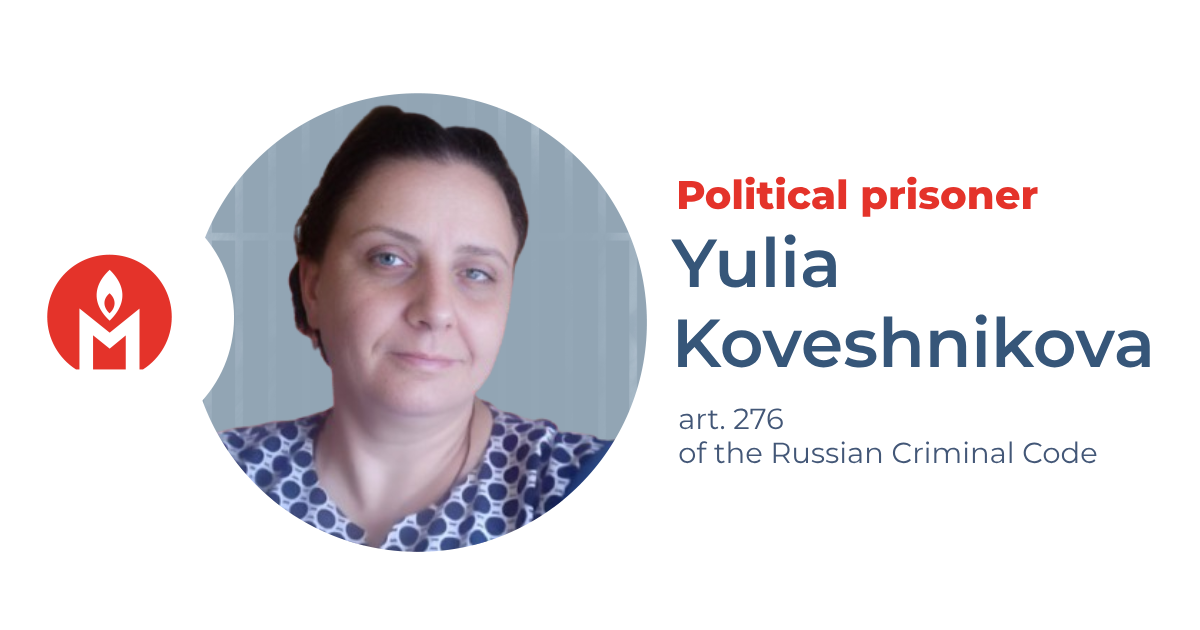Yulia Koveshnikova is a political prisoner
A Ukrainian from Melitopol has been sentenced to 13 years in a penal colony on espionage charges for a message sent to her husband
The ‘Political Prisoners. Memorial’ human rights project, in accordance with international standards, considers Yulia Koveshnikova a political prisoner. Koveshnikova was prosecuted and convicted on a charge of espionage for allegedly sending her husband, a serviceman in the Ukrainian armed forces, information about Russian troops. Koveshnikova’s criminal prosecution and conviction violated her right to a fair trial. We demand the release of Yulia Koveshnikova, that all criminal charges against her be dropped, and that her allegations of torture be investigated.

What were the charges against Yulia Koveshnikova?
Yulia Koveshnikova, from Melitopol in Ukraine’s Zaporizhzhia Oblast, remained in the city after it was occupied by Russian forces in order to care for her pets. She was engaged in volunteer work, helping search for missing Ukrainian soldiers, and openly expressed pro-Ukrainian views.
On 4 April 2023, Yulia Koveshnikova was abducted. For eight months, her relatives had no knowledge of her whereabouts. It later became known that she had initially been held with a bag over her head in a basement in Melitopol, then transferred to a pre-trial detention centre in Mariupol, and later to Crimea. She was eventually charged with espionage (Article 276 of the Russian Criminal Code). Russian security officials alleged she collected information on the location of Russian military equipment and personnel, which she sent to her husband, who serves in the Ukrainian armed forces. Koveshnikova denied this at her trial. However, the court relied on earlier confessions she had given immediately after being abducted.
On 7 June 2024, the so-called ‘Zaporizhzhia Oblast Court’, controlled by Russia on occupied Ukrainian territory, sentenced Yulia Koveshnikova to serve 13 years in a general regime penal colony.
Why do we consider Yulia Koveshnikova a political prisoner?
The prosecution and conviction of Yulia Koveshnikova were a gross violation of the Geneva Convention on the Protection of Civilian Persons in Time of War. She was effectively abducted and held for an extended period without legal status, legal representation, or contact with her family. Any confession obtained under such conditions is inadmissible as evidence and cannot form the basis for a prosecution.
The charge itself is highly questionable: the ‘collection of information’ referred to in court included simply observing from her window and reading local online sources, while ‘transmitting’ this information referred to private communications with her husband.
The charge of espionage is frequently used for politically motivated prosecutions of Ukrainians in territories occupied by Russia, in direct contradiction of international law, which prohibits the application of an occupying country’s laws to residents of occupied territories.
A detailed description of Yulia Koveshnikova’s case and of our position is available on our website.
Recognition of an individual as a political prisoner does not imply the project, ‘Political Prisoners. Memorial,’ agrees with, or approves, their views, statements, or actions.
How can you help?
You can write to Yulia Koveshnikova at the following address:
RU: 443047, г. Самара, ул. Утевская д. 18А, ИК-15 УФСИН России по Самарской области, ПФРСИ, Ковешниковой Юлии Александровне 1978 г. р.
EN: Yulia Oleksandrivna Koveshnikova (born 1978), Penal Colony No. 15, Federal Penitentiary Service of Russia for Samara Oblast, 18A Utevskaya Street, Samara, 443047, Russia.
You can also send emails via ZT (for payment with Russian bank cards), OVD-Info and Memorial-France (free of charge).
Please note that letters in languages other than Russian are highly unlikely to reach the intended recipient.
You can donate to help all political prisoners in Russia.
